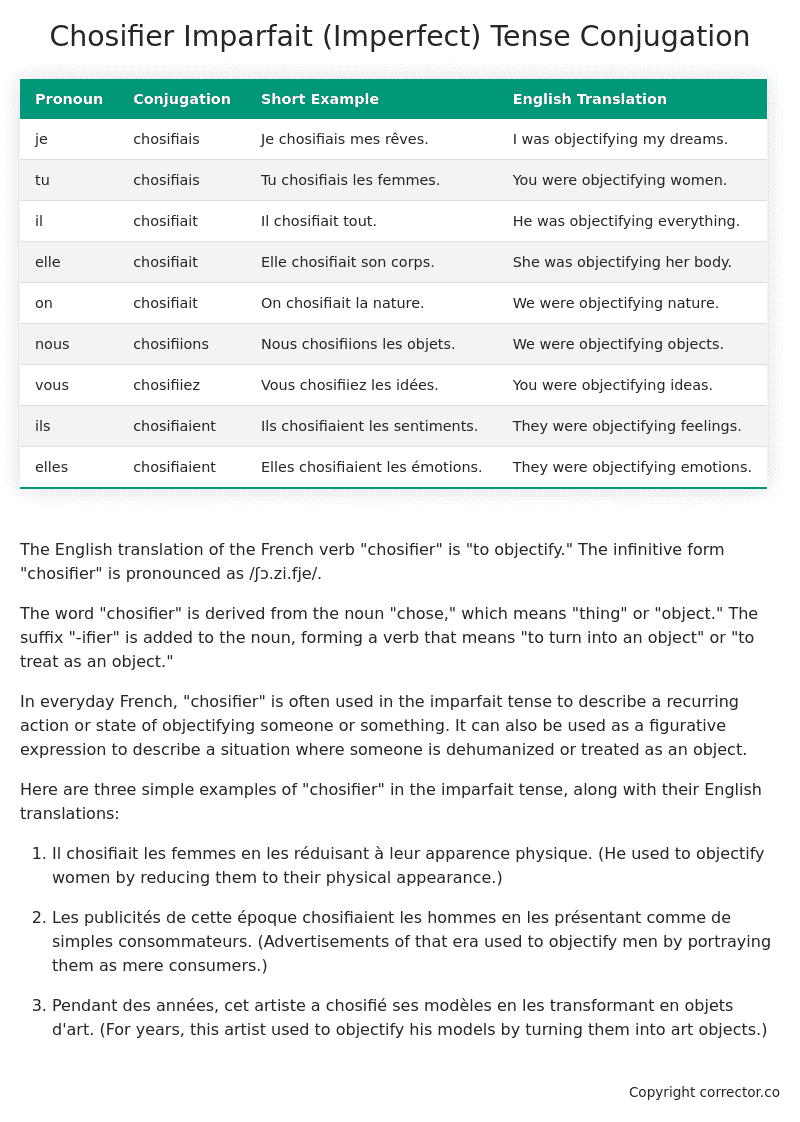Imparfait (Imperfect) Tense Conjugation of the French Verb chosifier
Introduction to the verb chosifier
The English translation of the French verb “chosifier” is “to objectify.” The infinitive form “chosifier” is pronounced as /ʃɔ.zi.fje/.
The word “chosifier” is derived from the noun “chose,” which means “thing” or “object.” The suffix “-ifier” is added to the noun, forming a verb that means “to turn into an object” or “to treat as an object.”
In everyday French, “chosifier” is often used in the imparfait tense to describe a recurring action or state of objectifying someone or something. It can also be used as a figurative expression to describe a situation where someone is dehumanized or treated as an object.
Here are three simple examples of “chosifier” in the imparfait tense, along with their English translations:
-
Il chosifiait les femmes en les réduisant à leur apparence physique.
(He used to objectify women by reducing them to their physical appearance.) -
Les publicités de cette époque chosifiaient les hommes en les présentant comme de simples consommateurs.
(Advertisements of that era used to objectify men by portraying them as mere consumers.) -
Pendant des années, cet artiste a chosifié ses modèles en les transformant en objets d’art.
(For years, this artist used to objectify his models by turning them into art objects.)
Table of the Imparfait (Imperfect) Tense Conjugation of chosifier
| Pronoun | Conjugation | Short Example | English Translation |
|---|---|---|---|
| je | chosifiais | Je chosifiais mes rêves. | I was objectifying my dreams. |
| tu | chosifiais | Tu chosifiais les femmes. | You were objectifying women. |
| il | chosifiait | Il chosifiait tout. | He was objectifying everything. |
| elle | chosifiait | Elle chosifiait son corps. | She was objectifying her body. |
| on | chosifiait | On chosifiait la nature. | We were objectifying nature. |
| nous | chosifiions | Nous chosifiions les objets. | We were objectifying objects. |
| vous | chosifiiez | Vous chosifiiez les idées. | You were objectifying ideas. |
| ils | chosifiaient | Ils chosifiaient les sentiments. | They were objectifying feelings. |
| elles | chosifiaient | Elles chosifiaient les émotions. | They were objectifying emotions. |
Other Conjugations for Chosifier.
Le Present (Present Tense) Conjugation of the French Verb chosifier
Imparfait (Imperfect) Tense Conjugation of the French Verb chosifier (You’re reading it right now!)
Passé Simple (Simple Past) Tense Conjugation of the French Verb chosifier
Passé Composé (Present Perfect) Tense Conjugation of the French Verb chosifier
Futur Simple (Simple Future) Tense Conjugation of the French Verb chosifier
Futur Proche (Near Future) Tense Conjugation of the French Verb chosifier
Plus-que-parfait (Pluperfect) Tense Conjugation of the French Verb chosifier
Passé Antérieur (Past Anterior) Tense Conjugation of the French Verb chosifier
Futur Antérieur (Future Anterior) Tense Conjugation of the French Verb chosifier
Subjonctif Présent (Subjunctive Present) Tense Conjugation of the French Verb chosifier
Subjonctif Passé (Subjunctive Past) Tense Conjugation of the French Verb chosifier
Subjonctif Imparfait (Subjunctive Imperfect) Tense Conjugation of the French Verb chosifier
Subjonctif Plus-que-parfait (Subjunctive Pluperfect) Tense Conjugation of the French Verb chosifier
Conditionnel Présent (Conditional Present) Tense Conjugation of the French Verb chosifier
Conditionnel Passé (Conditional Past) Tense Conjugation of the French Verb chosifier
Conditionnel Passé II (Conditional Past II) Tense Conjugation of the French Verb chosifier
L’impératif Présent (Imperative Present) Tense Conjugation of the French Verb chosifier
L’impératif Passé (Imperative Past) Tense Conjugation of the French Verb chosifier
L’infinitif Présent (Infinitive Present) Tense Conjugation of the French Verb chosifier
L’infinitif Passé (Infinitive Past) Tense Conjugation of the French Verb chosifier
Le Participe Présent (Present Participle) Tense Conjugation of the French Verb chosifier
Le Participe Passé (Past Participle) Tense Conjugation of the French Verb chosifier
Struggling with French verbs or the language in general? Why not use our free French Grammar Checker – no registration required!
Get a FREE Download Study Sheet of this Conjugation 🔥
Simply right click the image below, click “save image” and get your free reference for the chosifier imparfait tense conjugation!

Chosifier – About the French Imparfait Tense
NOTE: To take a deep dive into all the French tenses then see our article on Mastering French Tense Conjugation.
Formation of the Imparfait Tense
For regular -er verbs:
For regular -ir verbs
For regular -re verbs
Common Everyday Usage Patterns
Description of Past Habits
Background Information
Mental and Emotional States
It’s employed to express emotions, thoughts, or physical sensations in the past. For example: “J’étais content quand il est arrivé.” (I was happy when he arrived.)
Ongoing Actions
Points to Note About the Imparfait Tense
Passé Composé vs. Imparfait
Conditional
Si Clauses
Narration
I hope you enjoyed this article on the verb chosifier. Still in a learning mood? Check out another TOTALLY random French verb imparfait conjugation!


